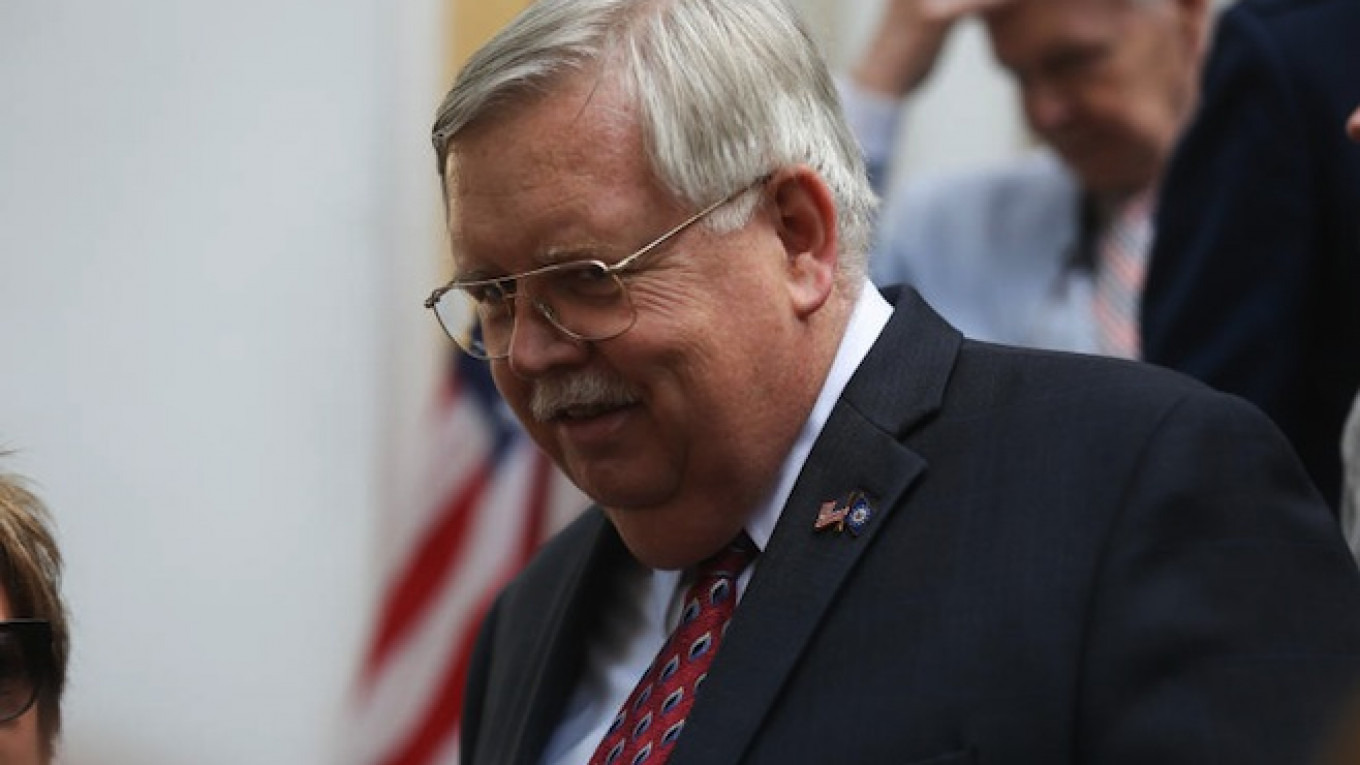The Russian government has shut down the U.S. Embassy's American Center in Moscow after 22 years in operation, Ambassador John Tefft said, warning the Kremlin is eroding ties that were preserved even during the Cold War.
“The U.S. Embassy in Moscow deeply regrets the Russian government’s unilateral decision to close the Embassy’s American Center at M. Rudomino All-Russia State Library of Foreign Literature in Moscow,” Tefft said in an online statement Wednesday.
“These latest unilateral steps further call into question the Russian government’s commitment to maintaining people-to-people ties between the Russian and American people, which continued even during the Cold War and other complicated moments in our countries’ long history,” Tefft said.
The American Center in Moscow is the largest and oldest of its kind in Russia, according to its website.
The center had received a notice from the foreign-language library, ending the agreement on the U.S. Embassy's “support,” and saying the center's director would be replaced as the library would “take full control of all of the center's activities,” Tefft said.
Financing
The library portrayed the move as targeting the U.S. Embassy's financing of the center, rather than its activities.
Library director Vadim Duda said in his own statement Wednesday that the library administration wanted the American Center to continue its work, all its employees to keep their jobs, the center to retain the offices and facilities it had been leasing, and preserve its programs.
“But we must put our cooperation in compliance with the demands of Russian law,” Duda said. “A state-run federal library cannot maintain the current agreement on the financing of the American Center, which, in effect, is the lease of facilities.”
The library proposed a “new scheme of contract relations,” Duda said, adding the library was “willing to support [the center's] activity even without financing from the American side.”
A new deal allowing the center to continue “independent work” could still be worked out, Duda said. But the new arrangement, if it is reached, could curtail U.S. involvement in the cultural center.
'Heartbroken'
The center's employees expressed dismay at the decision to shut down the American Center “as you know it.”
“We are all heartbroken by the news,” the center said in an online statement, adding: “Many questions and details are still being resolved.”
The programs scheduled for September remain in effect, but the prospects for future operations were in limbo, the center said.
The attempt to reshape the work of the American Center comes at a time of souring relations between Russia and the West over the crises in Ukraine and Syria. Moscow has been curtailing Western programs in the country, forcing Russian non-governmental organizations that receive funding from abroad to register as “foreign agents,” and passing a law banning foreign organizations Russia deems “undesirable.”
The U.S.-based National Endowment for Democracy was the first organization to get axed under that Russian law, when Moscow proclaimed the group “undesirable” this summer.
The move against the U.S. cultural center also comes a year after Russia shut down the largest student-exchange program with the U.S. — the Future Leaders Exchange Program, or FLEX.
Duda, the library director, said he agreed with Tefft on the importance of maintaining cultural ties and hoped the center would “not serve as a bargaining chip in the political situation.”
“We are ready to support [the center's] activity even without U.S. financing,” Duda said. “We believe this activity is exceptionally important for maintaining connections between our countries in such a complicated political situation.”
The foreign-language library's late director, Yekaterina Geniyeva, said in an interview published shortly before her death this summer that Culture Ministry officials had asked her to shut down the American Center.
Geniyeva had responded that the authorities could do as they pleased, but had demanded a written order stating that the authorities were shutting down the center “in connection with tense relations between the two states [U.S. and Russia],” she told Meduza news portal. The riposte seemed to have stalled a crackdown on the center — at least for a few months.
The American Center received more than 50,000 Russian visitors and held more than 400 cultural and educational events over the past year alone, hosting scores of prominent American speakers, including astronauts, actors, athletes, academics, politicians and authors, Tefft said in his statement.
A Message from The Moscow Times:
Dear readers,
We are facing unprecedented challenges. Russia's Prosecutor General's Office has designated The Moscow Times as an "undesirable" organization, criminalizing our work and putting our staff at risk of prosecution. This follows our earlier unjust labeling as a "foreign agent."
These actions are direct attempts to silence independent journalism in Russia. The authorities claim our work "discredits the decisions of the Russian leadership." We see things differently: we strive to provide accurate, unbiased reporting on Russia.
We, the journalists of The Moscow Times, refuse to be silenced. But to continue our work, we need your help.
Your support, no matter how small, makes a world of difference. If you can, please support us monthly starting from just $2. It's quick to set up, and every contribution makes a significant impact.
By supporting The Moscow Times, you're defending open, independent journalism in the face of repression. Thank you for standing with us.
Remind me later.






